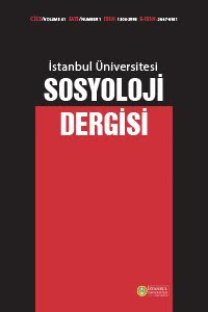Sabri Orman’s Inquiry into Social Justice Regarding al Ghazali’s Adalet-I Ijtimâ’iye Doctrine
Social justice, Justice, al Ghazali, Al-adl, Islamic jurisprudence, Islamic economics
Sabri Orman’s Inquiry into Social Justice Regarding al Ghazali’s Adalet-I Ijtimâ’iye Doctrine
Social justice, Justice, al Ghazali, Al-adl, Islamic jurisprudence, Islamic economics,
___
- Alatas, S. F. (2006). Alternative discourses in Asian social science: Responses to eurocentrism. Sage. google scholar
- Civila, S., Rodríguez, L. M. R., & Civila, A. (2020). The demonization of Islam through social media: A case study of #Stopislam in instagram. Publications, 8(4), 1–19. https://doi.org/10.3390/publications8040052 google scholar
- Cobban, A. (1999). The social interpretation of the French revolution. Cambridge University Press. google scholar
- Cook, C., & Wroughton, J. (1980). Overseas trade and the colonies. In English historical facts 1603- 1688 (pp. 165–181). Springer. google scholar Falagas, M. E., Zarkadoulia, E. A., & Samonis, G. (2006). Arab science in the golden age (750-1258 CE) and today. The FASEB Journal, 20(10), 1575–1753. https://doi.org/10.1096/fj.06-0803ufm google scholar
- Günther, S. (2005). Advice for teachers: The 9th century Muslim scholars Ibn Saḥnūn and al-Jāḥiẓ on pedagogy and didactics. In S. Günther (Ed.), Ideas, images, and methods of Portrayal (pp. 89–128). Brill. https://doi.org/10.1163/9789047407263_009 google scholar
- Irani, K. D., & Silver, M. (1995). Social justice in the ancient world. Greenwood Press. google scholar
- Jones, C. I. (2001). Was an industrial revolution inevitable? Economic growth over the very long run. The B.E. Journal of Macroeconomics, 1(2), 1–45. https://doi.org/10.2202/1534-6013.1028 google scholar
- Jordan, B. (1998). The new politics of welfare: Social justice in a global context. Sage. google scholar
- Khan, M. A. (1994). An introduction to Islamic economics. International Institute of Islamic Thought (IIIT). google scholar
- Lowry, S. T., & Gordon, B. L. J. (1998). Ancient and medieval economic ideas and concepts of Social justice. Brill. google scholar
- Makdisi, G. (2019). Rise of colleges. Edinburgh University Press. google scholar
- Miller, D. (2001). Principles of social justice. Harvard University Press. google scholar
- Orman, S. (2018). Al-Ghazâlî on justice and social justice. Turkish Journal of Islamic Economics, 5(2), 1–66. google scholar
- Pankhurst, R. (1999). Ethiopia, the aksum obelisk, and the Return of Africa’s cultural heritage. African Affairs, 98(391), 229–239. google scholar
- Selvaratnam, V. (1988). Higher education co-operation and western dominance of knowledge creation and flows in third world countries. Higher Education, 17(1), 41–68. google scholar
- Small, S. (2011). Slavery, colonialism and museums representations in Great Britain. Human Architecture: Journal of the Sociology of Self-Knowledge, 9(4), 117–28. google scholar
- Zidani, S. (2021). Whose pedagogy is it anyway? Decolonizing the syllabus through a critical embrace of difference. Media, Culture & Society, 43(5), 970–978. https://doi.org/10.1177/0163443720980922 google scholar
- ISSN: 1304-2998
- Yayın Aralığı: 2
- Başlangıç: 2020
- Yayıncı: İstanbul Üniv. Edebiyat Fak. Sosyoloji Böl.
Aşıya İlişkin Refleksler Üzerine Sosyolojik Bir Araştırma: Van Örneği
Suvat PARİN, Emin Yaşar DEMİRCİ
Kemal Tahir Romanlarında Türk Modernleşmesini Okumak: Bir Sınıflama Önerisi
Mehmet Güven AVCI, İsmail COŞKUN
The Ways of Representation of Individualism in Compulsory Career Planning Courses in Turkiye
İsa DEMİR, Türkan AKYOL GÜNER, Muhammed Macid DEMİR
Temsil ve Mekân: Dil ve Tarih-Coğrafya Fakültesi’nde Ortabahçenin Söylemsel İnşası
Improving Equality in the Education System of Turkiye
Pierre Bourdieu’nün Siyaset Sosyolojisi
Happiness at the Macro Level: A Critical Discussion on the Compatibility of Different Indicators
Sabri Orman’s Inquiry into Social Justice Regarding al Ghazali’s Adalet-I Ijtimâ’iye Doctrine
Rahmi Deniz ÖZBAY, Hassan SYED
Kavramlarla Oynamak: Ziya Gökalp Düşüncesinde Ulusötesi Kategoriler ve “Beynelmileliyet” Kavramı
